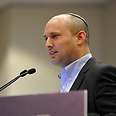
Bennett: We created anti-haredi discourse
Ultra-Orthodox civil service volunteers clash with economy minister during preparation event, accusing him of disobeying Torah. 'There is a feeling you're being persecuted, but it's the exact opposite,' he says
Bennett, who is in charge of the National-Civil Service Administration, welcomed the new recruits and praised the haredi public, but was met with accusations that he is harming the world of Torah through the Peri Committee bill for an equal share of the burden.
The minister, chairman of the national-religious Habayit Hayehudi party, argued that the outline initiated by the Peri Committee would benefit haredim too, as it recognizes Torah studies as a national value for the first time and incorporates this recognition into the law.
"Don’t belittle this," he said. "We are making history in this sense."
According to Bennett, "Studying Torah is a fundamental part of the burden, and it's very hard to wake up every morning and study Torah till the night. It's as hard as things I did in the army."
'Haredi integration in society stopped'
The young haredi men went on to accuse him of boasting cooperation with rabbis to draft haredim while disobeying "Da'as Torah" (the knowledge of Torah).
Bennett urged them to stop using slogans and not to turn themselves into "victims." Instead, he suggested that they study and familiarize themselves with the details of the Peri Committee proposal and discuss the heart of the matter.
The minister admitted, however, that he had made mistakes in recent months which led to the creation of an unnecessary discourse of hatred between different parts of the Israeli society, and said he regretted that.
Yet Bennett blasted those who "grabbed the opportunity" and instead of speeding up the integration of haredim into the Israeli society, stopped the process. "There is a feeling that you're being persecuted and that people want to harm you, but it's the exact opposite," he said.
In the heat of the argument, Bennett's skullcap fell off his head, and one of the new recruits noted, "It would be better if it stayed that way."
'Forget about slogans'
The festive event turned into a major clash, embarrassing the organizers who attempted to calm everybody down. Bennett insisted that it was important to hold the meeting, even if it was emotionally charged, and listen to the atmosphere among the haredi public.
"You can't touch the world of Torah without being closely familiar with it from within," one of the participants shouted at him. "Just like I won't intervene and privatize the universities, because I have no idea what is happening there – I expect (Finance Minister and Yesh Atid Chairman Yair) Lapid not to intervene either."
Others warned that "if the study of Torah among the Jewish people stops for just one moment, the world will no longer exist."
Bennett responded that the compromise achieved in the Peri Committee was "incredible" compared to Lapid's original "equal share" plan, which demanded universal draft for every 18-year-old.
He called on the meeting's participants to see the glass half full, as 100% of yeshiva students will be able to continue studying till the age of 21, and then 1,800 "elite" students will be exempted. Torah studies will be recognized as a national value, and the entire plan will only be executed in four years.
"Forget about slogans, this is an excellent plan," he said.
At the start of the meeting, the minister praised the haredi public, saying that the Israeli society had a lot to learn from it about devotion and living for values, ideals and mutual responsibility.
He stressed that the demand for an equal share of the burden was not patronizing, and called on them to continue integration into military or civil service. "I don't see peace in the horizon," he said. "There could be summits, but we know the truth. The entire Middle East is falling apart before our very eyes, and it's not like they joining the World Zionist Organization."
Bennett added that the dramatic changes in Arab countries were a security threat to Israel, and therefore it was necessary for haredim to join the forces defending the country and its residents.
'Haredim discriminated against in labor market'
As for the integration of haredim in the labor market, the minister said there was discrimination and that those claiming a haredi person has the same opportunities as a person with similar abilities were wrong.
"The stigmas and barriers must be broken," he said, promising "aggressive actions to break this glass ceiling," such as benefits to haredi soldiers and incentives to workplaces which take them in.
Sar-Shalom Jerbi, director of the National-Civil Service Administration, said that the Administration received dozens of appeals a day from people asking to join the service.
"I hereby declare that our contact with the rebbes and rabbis continues. We meet every three weeks and make sure to consult the rabbis and keep in touch," he said.
Jerbi added that the number of haredi volunteers was growing. "It's not easy, because the mudslinging against the service has increased recently, and yet volunteers arrive," he said. "Minister Bennett is personally working these days to improve the benefits."










